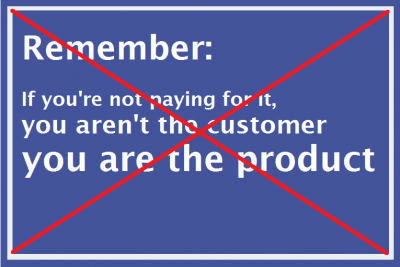Actually: You ARE the Customer, Not the Product

Don’t believe the hype. You’re the customer, whether you pay directly or by seeing ads.
Tell me if you’ve heard this one before: “On the internet, if you’re not paying for something, then you’re not the customer. You’re the product.”
This meme, and its various permutations, are meant to to convey that if you’re not shelling out direct cash for a service, that you should expect to be used by that service. Perhaps. But there are many many things wrong with it. In fact, it’s wrong in almost every way.
You are the customer. You can do things no “product” can do.
Think about the things you can do that a “product” can’t do:
- You can stop using the service. You can deny the company that provides it the revenue you represent. What product ever abandoned its parent company?
- You can look around for competitive offerings, and choose one of those. Again, no ‘product’ can do this. And this imposes pressure on those services that you and I use, and the companies behind them, that is very different than the model of customers as inert ‘products’ would imply.
- You can use the service more… or less. Your choices aren’t binary. You can scale up or down how much you use any of these services.
- You can tell the world how great this service is, how great this company is… Or how awful they are. You have the power not just to vote with your feet – but also with your voice, in all the myriad ways the modern world allows you to express it. Companies know this. And it’s incredibly important to them.
- You can make those choices on the basis of utility, or beauty, or privacy, or politics, or morality, or any principle or basis you choose. The reasons are entirely up to you.
- You can change the service itself. That’s right. Everyone tells me that Facebook is on a one-way path towards less and less privacy. So why is it that over the last 6 months, Facebook has steadily introduced more UI that has made it clearer and clearer to me (in very proactive ways) who can see what information, and how to change that? Those changes in Facebook’s UI and feature set are a response to customers. Not to ad buyers. But to you and I and everyone who complained about privacy. Inert ‘products’ don’t elicit change in the store shelves that house them.
Now, perhaps you’re sitting there, reading this, and saying “Ramez Naam has lost the plot. The real point here is that if a company isn’t charging me anything, they must be selling my data to make a buck.” Well, consider this:
What stops a company that does charge you money to use their service from also selling your data?
The reality is much more complex.
- Charging for a service does not in any way imply a good privacy policy. Getting your money does not mean that companies aren’t double-dipping to also sell your information.
- Similarly, monetizing via ads does not necessarily imply bad privacy. There are better and worse ad systems that reveal orders of magnitude different amounts of data to third parties.
What It’s Like Working On a Web Service
Where does my perspective on this come from? Well, I spent 7 years working on an ad-supported web service (Bing.com). And what did we call the hundreds of millions of people who came to our site every day? We called them customers. And what was our obsession? To maximize their success at their tasks, their happiness with our product, their likelihood of coming back as satisfied customers again, and their odds of telling someone else that they had a good experience with us.
Does that mean we completely ignored monetization? Of course not. The web services you use are, many of them, built by businesses like the ones spotted on a professional networking website. Those businesses exist to make a profit. But to make a profit, you have to have customers. And to have customers, to keep customers, and to grow your set of customers, you have to delight them, every day, again and again and again. That’s job #1 for any web service. No customers, no money.
Every successful web service knows that. Every successful web company knows that you’re the customer. Any who forget won’t be in business long.
